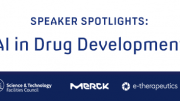Health services have been stretched for many years and over the past twenty-four months COVID has dramatically exacerbated the situation. Physicians, nurses, and administrators are burning out. And data privacy and security are more important than ever. But at the same time, wasted expenditures amount to 30% globally.
While there’s no way to completely alleviate the stress that healthcare professionals face, artificial intelligence (AI) is a strategic game changer that not only drastically assists clinicians’ jobs and improving patient experience but is also being used in the war against future COVID mutations.
Researchers at the University of Southern California have recently developed a machine learning (ML) model that creates vaccine design cycles in just seconds, instead of months or years.
Streamlining administration
As medicine continues to evolve, patients, clinicians, and researchers are relying more and more on AI to automate administrative tasks, streamline diagnosis, fast-track treatment research, predict risks, and manage public health.
In the US, one in every three dollars that is spent in the medical industry is for administrative costs alone. According to a report from the AHA, 40% of tasks performed by healthcare support staff and 33% of tasks performed by healthcare practitioners have the potential to be automated by AI. Automation can include scheduling appointments, inputting data into the electronic health record (EHR) and managing paperwork.
Scheduling appointments is time consuming, taking an average of 8 minutes per call. Self-scheduling technology based on AI offers 24/7 access and automatic reminders. And if a patient cancels their appointment, people on a waitlist are automatically notified of the opening. This automatic notification frees up front desk staff while also avoiding no-show appointments.
Increased accuracy of diagnosis
When it comes to diagnostics in medicine, AI can help with increased accuracy based on deep learning and other methods. It also helps providers proactively and efficiently manage care through risk score predictions and tailored treatment protocol recommendations.
Many cancers start with changes so small that no human could detect them—even with current medical imaging technology. AI programs armed with deep learning, however, can be “trained” to see the earliest changes in cell structure that typically lead to the development of cancerous cells. These programs alert oncologists to help them guide patient care protocols with greater accuracy and effectiveness. With all that’s expected of doctors, any level of efficiency gain or offloaded task can lighten the mental load.
Fast tracking research
With the help of AI, researchers can work quickly to develop medicine and treatments that more effectively target specific diseases. From transforming disease identification to discovering how to prevent and treat diseases, AI plays a key role in improving the lives of billions of people.
For patients, AI means better experiences and more personalised support. From streamlining appointment scheduling and rescheduling to improving care outcomes while automating personalised support for many needs, AI can make life easier and minimise time spent on the phone or searching for answers.
But it’s not just for patients and clinicians. AI has the potential to offer billions in savings for the drug discovery process by 2028. With AI, huge datasets can be analysed quickly, and hidden insights easily extracted—both tasks that would be nearly impossible for individual researchers to accomplish. AI helps predict the appropriate chemical compound properties for a drug, saving researchers trial and error time, and enabling a more effective drug. Overall, AI can save hundreds of person hours in a laboratory, resulting in an accelerated drug discovery pipeline.
The three keys to AI success in medicine
The promise of AI to advance healthcare is exciting but achieving maximum gains from it isn’t easy. You have to make sure that the data is available in the right place at the right time while complying with strict regulations.
So, your data infrastructure really matters. The problem is that many AI architectures are unnecessarily complex, making them inefficient and difficult to scale. That’s why, when considering an AI strategy, it’s critical to factor three things into planning.
- Data volume. Accuracy and data volume go hand in hand. And your data volume compounds rapidly. The best-of-the-best machine learning and deep learning frameworks are key to efficiently training large AI models.
- Data movement. Different AI applications need access to different types of structured and unstructured data from across the edge and throughout clinical applications and cloud environments. An ecosystem-spanning data pipeline with built-in data protection capabilities is key.
- The need for speed. When lives are on the line and clinicians and nurses are scrambling to keep up, instant response times are essential for all kinds of applications, from remote monitoring devices to imaging to managing nursing assistants.
As we’ve seen, in the future, AI is likely to play an even greater role in medicine than it already is. However, in the highly regulated healthcare industry, striking the right balance between data movement needs and compliance requirements is especially challenging.
With the industry continuing to be under so much pressure, there’s a potential to limit some of this by working with specialists that have a proven AI knowledge. Only then will clinicians be able to streamline tasks, improve the accuracy of diagnostics, and develop drugs at an improved pace.
By Tim Skinner, Director UK Public Sector at NetApp a leading Cloud-led, data management company





